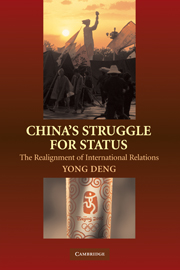
-
Select format
-
- Publisher:
- Cambridge University Press
- Publication date:
- September 2012
- April 2008
- ISBN:
- 9780511790768
- 9780521886666
- 9780521714150
- Dimensions:
- (228 x 152 mm)
- Weight & Pages:
- 0.53kg, 314 Pages
- Dimensions:
- (228 x 152 mm)
- Weight & Pages:
- 0.41kg, 314 Pages
You may already have access via personal or institutional login
Book description
At the end of the Cold War the People's Republic of China found itself in an international crisis, facing severe problems in both domestic politics and foreign policy. Nearly two decades later, Yong Deng provides an original account of China's remarkable rise from the periphery to the center stage of the post-Cold War world. Deng examines how the once beleaguered country has adapted to, and proactively realigned, the international hierarchy, great-power politics, and its regional and global environment in order to carve out an international path within the globalized world. Creatively engaging with mainstream international relations theories and drawing extensively from original Chinese material, this is a well-grounded assessment of the promises and challenges of China's struggle to manage the interlacing of its domestic and international transitions and the interactive process between its rise and evolving world politics.
Reviews
'… his book offers good insights into China's move from the periphery towards the centre of world affairs. He draws on many interesting Chinese sources, including for example academics who have argued that China will achieve full international recognition only when it embraces democracy.'
Source: Asian Affairs
Contents
Metrics
Full text views
Full text views help Loading metrics...
Loading metrics...
* Views captured on Cambridge Core between #date#. This data will be updated every 24 hours.
Usage data cannot currently be displayed.
Accessibility standard: Unknown
Why this information is here
This section outlines the accessibility features of this content - including support for screen readers, full keyboard navigation and high-contrast display options. This may not be relevant for you.
Accessibility Information
Accessibility compliance for the PDF of this book is currently unknown and may be updated in the future.


